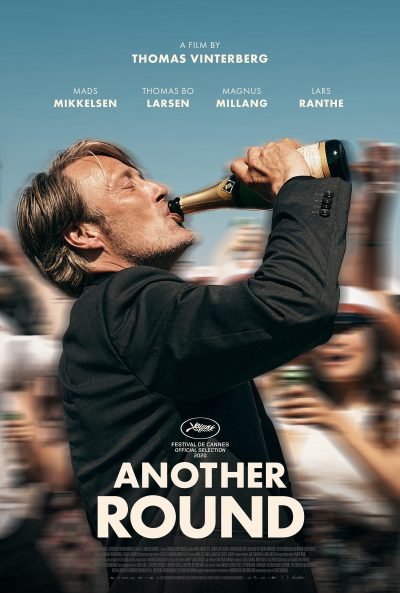“Another Round” (“Druk”) (2020). Cast: Mads Mikkelsen, Thomas Bo Larsen, Magnus Millang, Lars Ranthe, Maria Bonnevie, Helene Reingaard Neumann, Susse Wold, Magnus Sjørup, Silas Cornelius Van, Albert Rudbeck Lindhardt, Fredrik W. Rasmussen, Aya Grann, Aksel Vedsegaard. Director: Thomas Vinterberg. Screenplay: Thomas Vinterberg and Tobias Lindholm. Web site. Trailer.
Is it possible that something can be harnessed for good, on the one hand, and for just the opposite, on the other? If we put our mind to it, we can probably think of many examples. Fire, for instance, can be used for cooking and heating when employed judiciously. At the same time, though, it could also be a tool for arsonists. Similarly, there are countless instances where knives can serve useful purposes and many others where they can wreak havoc. Some would contend that nuclear energy can be both beneficial and destructive, depending on how it’s used. And on and on it goes for numerous other devices, substances and technologies.

So, in light of the foregoing, is it possible to look upon alcohol use in a comparable way? Are there indeed two sides to the liquor coin? That’s what four old friends want to find out in the unconventional saga of “Another Round” (“Druk”). But, one might legitimately ask, why would such a question come up in the first place?
Martin (Mads Mikkelsen) is a forty-something high school history teacher and married father of two who’s been drifting through life of late. His directionless funk has been going on for a while, impacting multiple areas of his life. He feels he’s lost something when it comes to his effectiveness as a teacher, especially when a class of seniors confronts him with their concerns about whether he’ll be able to prepare them adequately for their final exams. He also worries that his wife, Anika (Maria Bonnevie), has lost interest in him and that his sons, Jonas (Magnus Sjørup) and Kasper (Silas Cornelius Van), don’t take him seriously. These circumstances weigh on him, because he’s come to believe that he’s far from the person he was when he was younger – a onetime bright, shining star full of promise that has never materialized. And, now that he’s comfortably settling into middle age, he’s worried that he’ll never get back what he’s lost, that he’ll continue to slide into a morass of obscurity, mediocrity and growing ineffectiveness.
He’s further reminded of all this while attending a 40th birthday dinner for his long-time friend and fellow teacher, Nikolaj (Magnus Millang). During the party, these concerns are echoed in conversations among the guest of honor and the other celebrants, Tommy (Thomas Bo Larsen) and Peter (Lars Ranthe), also teachers and long-time friends. They speculate about various solutions to Martin’s dilemma, in large part because they’ve all been experiencing similar feelings themselves of late. But what realistically are they to do?
One of the most unusual suggestions comes up somewhat casually during one of the many toasts made to the birthday boy. Citing an obscure theory attributed to Norwegian psychiatrist and author Finn Skårderud, the four friends debate the therapist’s contention that humans are born with a blood alcohol deficiency and that intentionally raising it to make up for that lack can work wonders in many ways. According to the hypothesis, consuming just enough alcohol to raise one’s blood alcohol level to 0.05% – and then continuing to drink just enough to sustain the level at that point – will make up for that lack. With a blood alcohol level perpetually maintained on the brink of euphoria, the theory goes, one can relieve stress, boost personal confidence, remove limiting inhibitions and unleash untapped reserves of creativity, developments that are seen as crucial in helping individuals get back in step with their lives.

Martin is initially skeptical. In fact, he’s so concerned with maintaining his sense of personal responsibility that he doesn’t even join in the initial series of toasts, citing the fact that he’s driving. However, the more Nikolaj, Tommy and Peter ruminate on the potential benefits of such a practice, the more intrigued Martin becomes. He genuinely wants to get his mojo back, and, if a carefully regulated regimen of alcohol consumption will enable that, then maybe it’s an option he should consider, especially if his buddies enthusiastically sign on for the ride and agree to provide mutual support to one another. And, just to add an air of legitimacy to their experiment, they agree to document their experience in the form of a study for publication.
As the quartet of “researchers” launches into their work, they agree on certain conditions. For example, they won’t become reckless by engaging in acts like drunk driving. Because they’re high school teachers, they will maintain a degree of discretion and respectability in their drinking practices to avoid the risk of such activity costing them their jobs. They also seek to drink just enough to reach and maintain the desired blood alcohol level without spilling over into unbridled inebriation. In fact, they even set designated alcohol consumption hours, following the “disciplined” examples set by other noteworthy drinkers who went on to great accomplishments in their respective fields of endeavor, such as Ernest Hemingway and Winston Churchill.
As the experiment begins, Martin, Nikolaj, Tommy and Peter find that Skårderud’s claims have merit. Professionally, they all perform better as teachers, coming up with innovative ways of instructing their students and bolstering their pupils’ interest in the subject matter. Improvements on the homefront surface, too, most notably for Martin, who develops a closeness with Anika and a bond with his sons unlike anything he’s seen in years. But, before long, the question becomes, “Can all this be maintained?”
With sustained alcohol consumption soon comes increased alcohol consumption. All of the supposed safeguards that were implemented at the start of the experiment begin to erode, and the “benefits” that were initially realized begin to slip away, worsening to levels below those that were initially in place. But at what point will the four friends realize this? And can they repair their circumstances before they’re too late?

When dealing with something potentially volatile, it should go without saying that we must exercise caution, for we’re ultimately responsible for what happens. Based on the foregoing, as this story illustrates, that’s certainly true when it comes to a substance like alcohol. But, in a larger context, that’s even more significant when it comes to the management and deployment of something more powerful, such as our beliefs. They can have tremendous impact and persistence, even if those qualities aren’t always readily apparent. This is particularly true when it comes to our use of them through the conscious creation process, the philosophy that maintains we draw upon our thoughts, beliefs and intents in the manifestation of the reality we each experience. And, in this case, that can’t be emphasized enough.
The beliefs that Martin and his friends tap into in launching their experiment probably seem somewhat suspect from the outset. Even Martin is initially skeptical. After all, who has ever heard of the notion of humans possessing an inherent blood alcohol deficiency? Some studies have suggested that certain animals naturally produce their own internal alcohol as a means of generating warmth under conditions of extreme cold, but when has it ever been suggested that we can somehow mix our own innate margaritas, especially for personal improvement?
An old saying goes that, “If something is too good to be true, it probably is.” So it would seem with the notion put forth here. Yet Martin and his friends so badly want to recover what they think they’ve lost that they’re likely to believe just about anything, especially if the proposed solution has elements of enjoyment and simplicity associated with it. They’re willing to put their faith and trust in the belief that a raised and sustained blood alcohol level will somehow restore the vigor of their youth. And, in the process, they’re apparently willing to overlook the potential downside of their undertaking, even though their tacit skepticism quietly suggests otherwise. That doubt is, in itself, a belief, one that rides alongside their conviction that Skårderud’s hypothesis will bring them the salvation they seek. That mix of ostensibly contradictory beliefs is a killer, one whose potency outstrips the strongest Long Island iced tea one can imagine.
This obviously raises critical issues of personal responsibility. Given that we each create our own existence, we’re each inherently responsible for what manifests. And, considering the potentially explosive mix of materials and beliefs present here, the importance of responsibility steps to the forefront, both for what the four friends create for themselves and whatever impact it may have on those around them. With students and family members within the purview of the amateur researchers, there’s a lot at stake besides the welfare of those conducting the experiment. Even though they may be convinced that everything will turn out just fine, can they be sure of that, especially given the seemingly incongruous belief mix they’re drawing upon? Where is the responsibility in all that? How will matters play out? And what effect will they ultimately have?

Some could argue that the responsibility question applies here not only to the characters in the story, but also to the filmmakers themselves. One might legitimately ask, how responsible is it for a director to make a movie that raises an idea such as the one presented here? Indeed, is it wise to propose the kind of notion put forth in the film? Doesn’t it run the risk of viewers trying out Skårderud’s idea for themselves?
That argument indeed has merit. However, as director Thomas Vinterberg has observed, questions regarding the range of reasons underlying alcohol use are worthy of exploration, despite the fact that they often go undiscussed. This is particularly true, he notes, in a country like Denmark, where alcohol consumption – often to excess – occupies a significant place in the country’s culture, for better or worse. This film, he believes, is an attempt to bring up that subject for examination.
As the story shows, all may not necessarily be bad when it comes to the question of alcohol consumption. Given the initial results that Martin and his friends experience, there may be something to be said for moderate levels of drinking. It’s difficult to deny the positive outcomes they experience. But can they (or anyone, for that matter) maintain such results over time? The characters argue in favor of this belief based on their own outcomes, as well as those of role models like Hemingway, who drank regularly and produced volumes of superb finished works. But is that indeed true, given, for example, what happened to Hemingway in the end?
In many ways, this illustrates the dual-edged sword that creation can be. As noted above, it’s truly possible for some items and ideas to yield both positive and negative results, depending on how they’re employed. What matters is the beliefs underlying their use. And, given how powerful and persistent these notions can be, it’s easy to see how potent and long-lasting they often are. This is true both for beliefs that operate individually or in tandem with others, no matter how credible, unrealistic, dubious or delusional they may ultimately be.

Can a film realistically straddle the fence of a controversial subject without getting its hands dirty despite the risk of angering proponents on each side of that issue? That’s what “Another Round” seeks to do. Director Vinterberg has said that, in making this film, he wanted to examine all sides of the subject of alcohol consumption, even if it’s not often discussed as openly and frankly as it is here. He asserts that he has attempted to shed light on a topic that’s an especially important aspect of Danish society. Even the original Danish title – “Druk,” which literally translates as “Drunk” or “Drinking” – Vinterberg says, has meaning that goes beyond these mere words, carrying connotations that are inherent to the country’s culture and may not be readily apparent in the ways of other nations, ideas he believes are worthy of exploration through a story such as this. Those ideas may not be as easily recognizable to viewers outside of Denmark, yet they’re likely just as pertinent elsewhere when examined on their face, giving the film and its subject matter a universality that may not have been widely considered before.
This edgy comedy-drama draws upon an innately controversial narrative in telling its story, but Vinterberg manages to navigate through it skillfully, even if the final product is sometimes a little too unrealistically tidy. The picture’s closing sequence is also overlong and arguably feels somewhat unresolved. However, these shortcomings are overcome by the fine ensemble cast, especially the performance of Mikkelsen, who proves once again that he’s one of the most underrated performers in the business. All of that aside, no matter how one views this offering, it’s sure to provoke strong responses, but no one is likely to come away from it without having a well-defined opinion.
“Another Round” is generating considerable awards season buzz as a leading contender in foreign language film categories, having already received numerous film festival honors and earned spots on the top 10 lists of many movie critics. It will be interesting to see if that translates into nominations in the upcoming award competitions. The film is currently available for streaming online.
There’s a fine line between reasonable, responsible experimentation and reckless, unrealistic wishful thinking, and that divide can become increasingly narrower when potentially troubling elements are wrapped up in the mix. In instances like this, we must remain vigilant about what we do and how we proceed, for, when we cross certain boundaries, it may be difficult, if not impossible, to turn back. Whatever initial gains we might attain could be quickly wiped out, perhaps diminishing even further beyond what we had when we embarked upon such dubious undertakings. We’d be wise to think about that the next time we consider raising a glass.
Copyright © 2021, by Brent Marchant. All rights reserved.

No comments:
Post a Comment